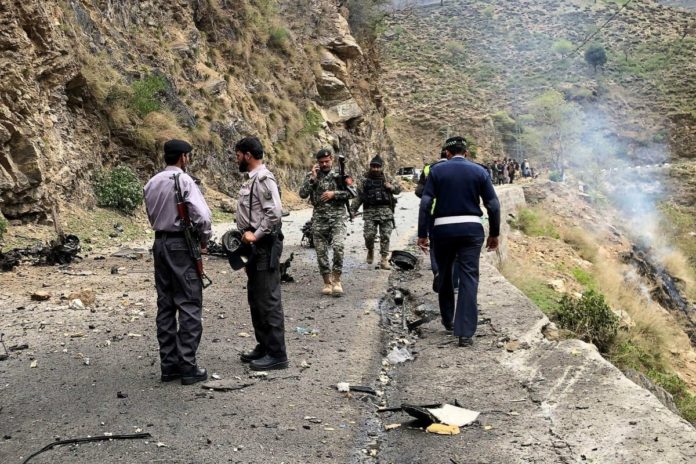Beijing strongly condemned a suicide bombing on Tuesday that killed five Chinese nationals in Pakistan and pledged to continue working on the flagship China-Pakistan Economic Corridor under the Belt and Road Initiative.
“China opposes all forms of terrorism and firmly supports Pakistan in its efforts to combat terrorism,” China’s Ministry of Foreign Affairs said in a statement.
It vowed to strengthen cooperation with Islamabad to protect the security of Chinese personnel, projects and institutions in Pakistan.
“China and Pakistan are all-weather strategic cooperative partners and ‘ironclad’ brothers, and the China-Pakistan Economic Corridor (CPEC) has made significant contributions to Pakistan’s economic and social development,” the Chinese foreign ministry said on Wednesday.
“Any attempt to undermine China-Pakistan cooperation will never succeed.”
A suicide bomber rammed a vehicle into a convoy of Chinese engineers working on a dam project in northwest Pakistan’s Khyber Pakhtunkhwa province on Tuesday, killing six, police said. Five Chinese nationals and their Pakistani driver were killed.
“China demands that Pakistan promptly investigate the truth behind the incident, make every effort to apprehend the perpetrators and bring them to justice, and take practical and effective measures to protect the safety of Chinese citizens,” the ministry said.
Chinese ambassador to Pakistan Jiang Zaidong visited the site of the dam on Wednesday to express condolences to the Chinese staff and stressed that proper handling of the aftermath – especially making arrangements for the victims – should be the immediate priority.
He also instructed the project team to “strictly, realistically and comprehensively strengthen security measures”, improve employees’ emotional support and well-being, and ensure the safety and stability of the workforce.
Pakistani Foreign Minister Ishaq Dar has condemned the attack, saying Islamabad would carry on its fight against militants.
Pakistani Prime Minister Shehbaz Sharif visited the Chinese embassy in Pakistan on Tuesday afternoon and vowed to carry out an investigation.
“We will swiftly investigate the incident and punish the perpetrators severely. We will never allow the evil plot to undermine the steadfast friendship between Pakistan and China to succeed,” he said.
It was the third major attack on Chinese interests in the South Asian country in a week, with the first two targeting a naval airbase and a strategic port in the southwest province of Balochistan, where China has invested billions in infrastructure projects.
The attack on Tuesday echoed another that occurred in the area in July 2021 when a suicide bomber on a bus killed 13 people, including nine Chinese workers. More than 20 Chinese personnel were injured in that attack.
So far, no terrorist group has claimed responsibility for the most recent attack, nor has anyone claimed responsibility for the 2021 attack.
Chinese engineers have been working on a number of projects in Pakistan. Beijing has invested heavily in infrastructure as part of the CPEC under the belt and road plan, Beijing’s global infrastructure project.
The Dasu hydropower project, where the engineers killed in the most recent attack worked, is one of the biggest Chinese-funded hydroelectric projects in Pakistan. The investment deal was signed in 2017, and Wuhan-based engineering firm China Gezhouba Group Company Limited is overseeing the project.
Originally scheduled to be operational this year, the project had a total investment of 511 billion Pakistani rupees (US$1.8 million) as of 2020.
As of the end of 2022, the CPEC had brought in total direct investment of US$25.4 billion to Pakistan, official news agency Xinhua reported, citing data from the Chinese embassy in Pakistan.
It generated 236,000 jobs, eased the construction of 510km (317 miles) of highway, and contributed to the development of an 886km national power transmission network in Pakistan.
The Chinese embassy in Pakistan issued an urgent security advisory following the attack on Tuesday, warning Chinese citizens of the local security risks.
“The Chinese embassy in Pakistan urgently reminds Chinese citizens, enterprises, and projects in Pakistan to remain highly vigilant, closely monitor the local security situation, take precautions against security risks, avoid visiting crowded places, and refrain from unnecessary outings,” it said.
Zhu Yongbiao, a professor at Lanzhou University’s School of Politics and International Relations, said the attack might affect China’s investment in Pakistan but would not have a major influence on the two countries’ economic cooperation.
“Overall speaking, Pakistan’s terrorism situation is deteriorating sharply. Due to China and Pakistan’s special relationship, the large amount of Chinese investment and personnel will become a target more easily,” Zhu said.
“The current investment from China may not be cut. However, some additional investment projects might be suspended temporarily,” Zhu said.
Abdul Basit, an associate research fellow at the S. Rajaratnam School of International Studies with Singapore’s Nanyang Technological University, agreed that the attack would not derail the overall relationship between Beijing and Islamabad, but added China would have doubts about Pakistan’s security capabilities.
“There will be concerns and reservations from China about the effectiveness of the security,” he said, adding that Pakistan was responsible for arranging security at the hydropower station. “Why was [Pakistani security] unable to stop the attack?”
Basit predicted that the attack might encourage Chinese companies to hire their own security personnel, one of the major points of contention between the two countries.
“China has been pushing Pakistan to allow private Chinese security companies to come and do the security for the Chinese projects in Pakistan,” he said.
“Pakistan, of course, has refused that till now because if they do that, it would reflect poorly on Pakistani security institutions.”
Courtesy: SCMP




